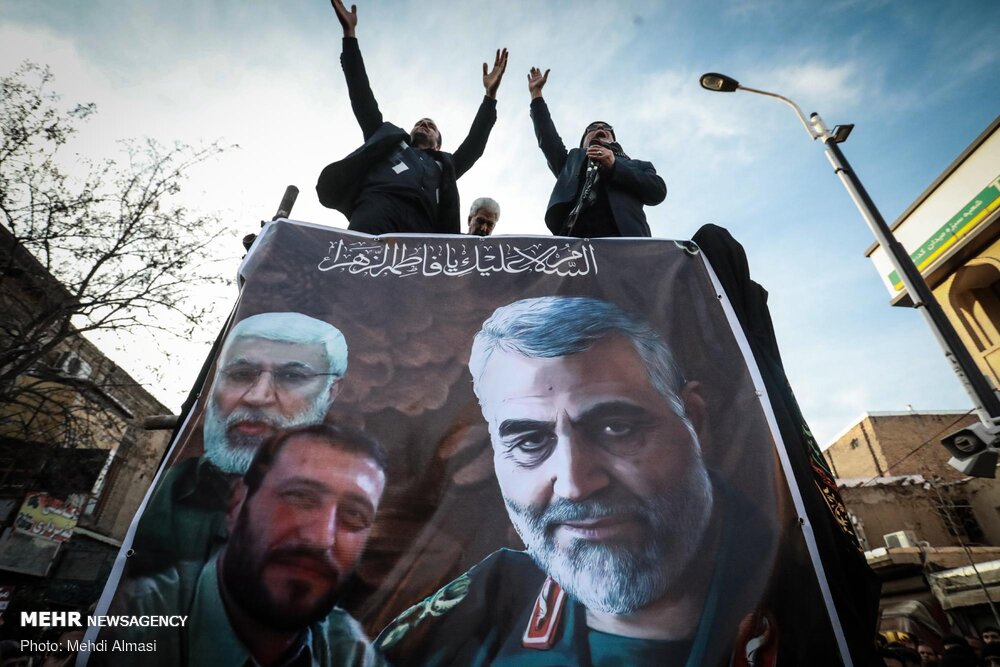A Turning Point

In what is widely considered a US act of terrorism, President Trump ordered an assassination team to eliminate Maj. Gen. Qassem Soleimani, leader of the foreign wing of Iran’s Islamic Revolutionary Guard Corp and Abu Mahdi al-Mohandes, commander of part of Iraqi’s national defence force on a road leading to Baghdad International Airport on Jan. 2, 2020.
While the cynical reason given for this escalation is deterrence, the true reason appears to be to divert attention from domestic pressure to impeach President Trump for political corruption
None Dare Call It Conspiracy
On Friday Dec. 27th 2019 a US civilian contractor was killed in a rocket attack on the K1 military base in oil province of Kirkuk in northern Baghdad where US service members and civilian contractors were located.
While no one to date has claimed responsibility, the US in retaliation conducted air strikes in Iraq and Syria against Iraqi militia units affiliated to Iraq national defence force whom US blamed for the attack. Weapon caches and command and control centres at five sites associated with Kataib Hezbollah were hit on Sunday, 29th Dec. 2019. Iraqi officials confirmed 25 were killed and more than 51 injured. Following this, part of the US Embassy Green Zone was occupied in a peaceful protest.
This sequence of events led to Maj. Gen. Qassem Soleimani's presence in Baghdad and the opportunity for the US to assassinate him.
A Turning Point
The assassinations of Maj. Gen. Qassem Soleimani and Commander al-Muhandis are a turning point not only in the Persian Gulf and Middle East but also in Eurasia generally. Severe retaliation from Muslim world against US and its allies is to be expected.
So, following the news of the unlawful assassination of Maj. Gen. Qassem Soleimani’s by the US I asked Mr. Chris Cook, Senior Research Fellow, University College London, about his views as to the significance of this tragic event, what Iran's response should be.
“I believe that this is a very rare event: an assassination of truly historic strategic significance and potential consequences. If Iran's response is smart and strategic, then I do not believe Soleimani will be seen to have died in vain.”
I asked Mr Cook to outline US strategy.
“As William Engdahl has written, the organising principle of US foreign policy for the last 100 years has been US energy security achieved through military and financial hegemony or dominance. President Obama pursued a smart strategy and strongly supported global institutions such as the UN. The US JCPOA rapprochement with Iran, strategic presence in Qatar and focus on the Southern Corridor energy route from the Caspian Sea were all predicated on a US “Transition through Gas” energy strategy to achieve a low carbon economy. Obama procured massive investment in US shale oil supported and funded through five years of oil market manipulation and which led to a successful outcome of US freedom from reliance on Saudi oil.”
I observed that Mr Cook has written a great deal about how President Trump announced the replacement of this Obama strategy with the 'Energy Dominance' strategy on 29th June 2017 which has now been implemented. How is this almost unprecedented assassination consistent with that strategy?
“Clearly elements in the US government have sought war with Iran throughout Trump's presidency, but the fact is Trump detests war. It seems to me that Bolton's departure from office followed failed military escalation in the Persian Gulf, and the recent episode in Iran following gasoline price increases clearly had Pompeo's CIA fingerprints all over it.
But this assassination appears to me to be a purely political provocation for US domestic consumption with the President facing impeachment and an election approaching. More than that, following the abandonment by the US of a series of multilateral institutions in favour of bilateral it is a final challenge by the US to the rest of the world; a rejection of international norms; and an assertion of US hegemony and dominance.”
What then should be Iran's strategic response?
“The US has repudiated international institutions and the norms of international diplomacy and this will have profound consequences. I believe any tactical retaliation by Iran while understandable, could play into the hands of US elements behind the assassination and into the hands of those in Iran who profit from sanctions, conflict and destruction. The optimal strategy in my opinion is a constructive energy for peace initiative through the creation of new international institutions and instruments.
A cynic wrote that progress is made one funeral at a time: I believe that Soleimani will not have died in vain if his funeral is followed by a new and collaborative multilateral peace initiative, and it seems to me that in a strange way, the UK , post-Brexit could be well-placed to facilitate this.”
Conclusion
While burning with anger against this detestable and unconscionable US conduct I agree with Mr Cook that a measured strategic response is preferable to a tactical escalation. While destroying enemies in retaliation is a natural reaction, this outrage offers a historic opportunity to preserve US lives while destroying US global domination through intelligent mobilisation of anti-US sentiment as well as the role of US dollar in global economy.
I am sure such an outcome would have been Maj Gen Soleimani's wish after a career spent fighting US hegemony and domination in the Middle East and it is why throughout my career I have striven for constructive win/win policies such as Energy for Peace.
Leave a Comment